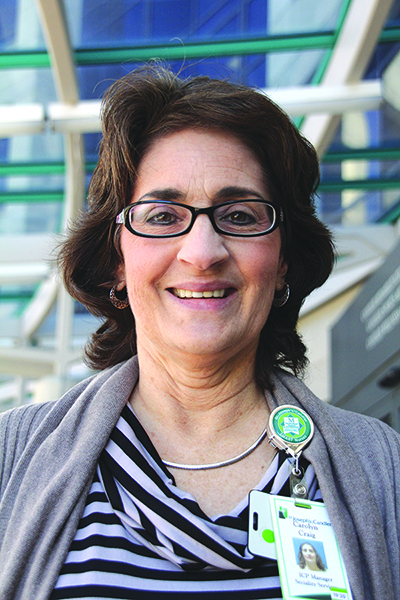Bringing High Tech Into Hand Hygiene
Carolyn Craig, RN

Infection Prevention Clinical Manager, St. Joseph’s/Candler
Smart Living: Hand hygiene is a huge priority for hospitals for both the patient’s safety and wellbeing and also for the nurses and hospital staff. How does St. Joseph’s/Candler ensure that hand hygiene is always a priority?
Carolyn Craig: Knowing that hand hygiene is the most important thing we can do to prevent infections, we’ve always worked on a rigorous program of compliance here. Usually our nurse managers or an assigned co-worker would observe the nurses and staff on their units. It worked well, but manual observation has limitations. Recently, however, we have implemented a new technology that allows an electronic system to monitor every patient room at any given time. This obviously gives us a significant advantage in obtaining data to see which areas consistently meet our standards and also if there are places where we could improve.
SL: How does it work?
CC: The technology developed by CenTrak works with the nurse locator system that is already in place at St. Joseph’s/Candler. The soap dispenser and liquid sanitizer dispensers are now electronic and have sensors that can track who is using them and when. Caregivers should be doing hand hygiene when they enter and exit a room, and any time while they are in the room that they could touch something with bacteria. Since the computer creates the report, we can spend more time with patients while still being able to measure our progress and meet our goals—all more accurately than ever before.
SL: How do compliance goals affect patient care?
CC: All of this is about protecting our patients as well as protecting ourselves. It’s not about surveillance, but about always finding opportunities for improvement. When compliance rates go up, infection rates go down, which is a great achievement when you consider how easily bacteria can spread. Anything you touch—a keyboard, telephone, elevator button—can spread bacteria. With excellent habits— or good habits made excellent through the help of this tech—we are preventing that transmission.
Patients, of course, really appreciate seeing that the person caring for them has great hand hygiene. I hope, as well, that they pick up those habits for themselves. I carry hand sanitizer in my car because I know if I pump gas or get cash back at a store, I will be touching something that countless other people have touched. Bacteria can live on surfaces for days, maybe weeks, so that’s how they can spread. It would be wonderful for everyone to develop better hand hygiene habits and I would like for our staff to be role models.